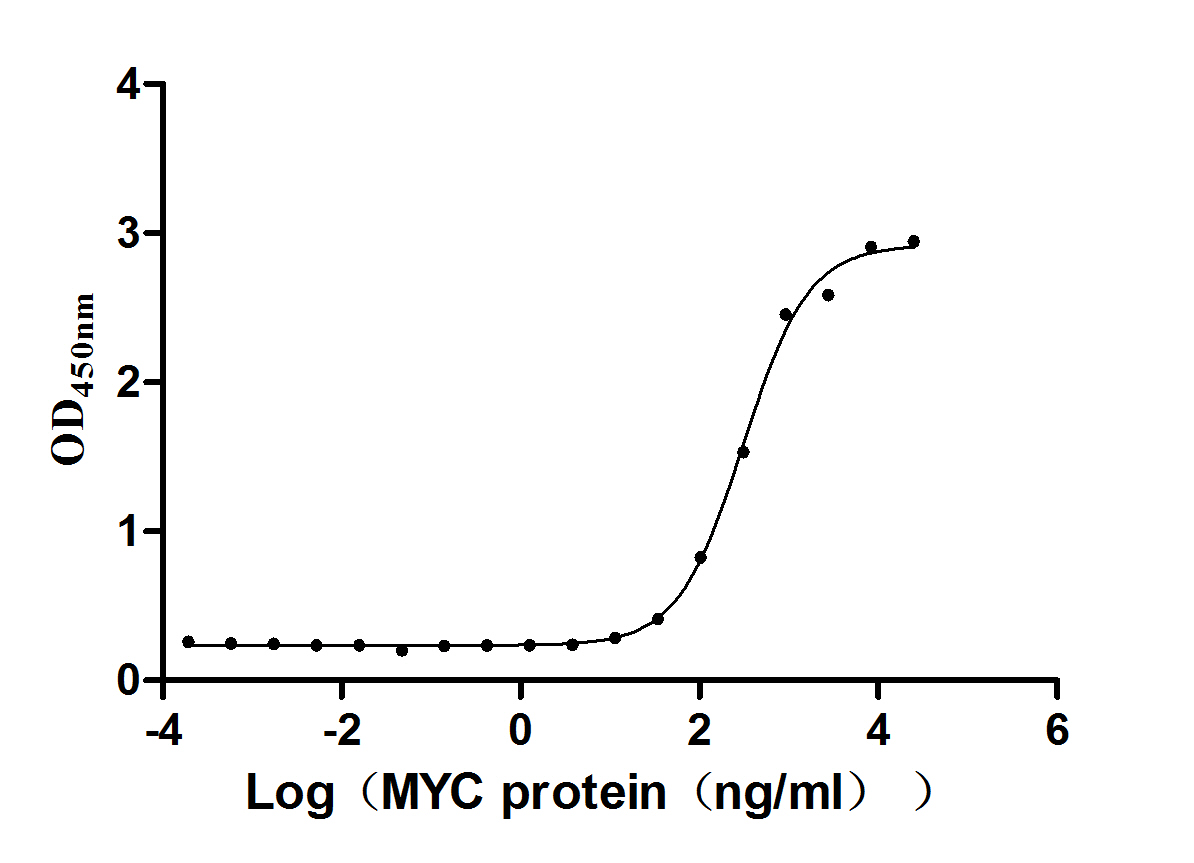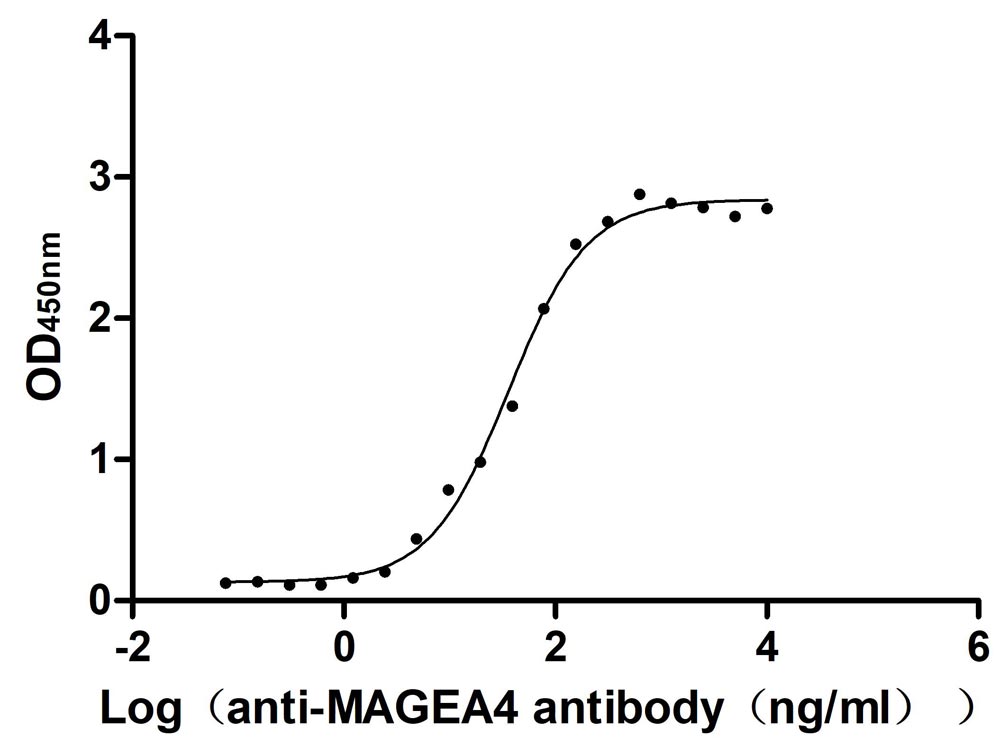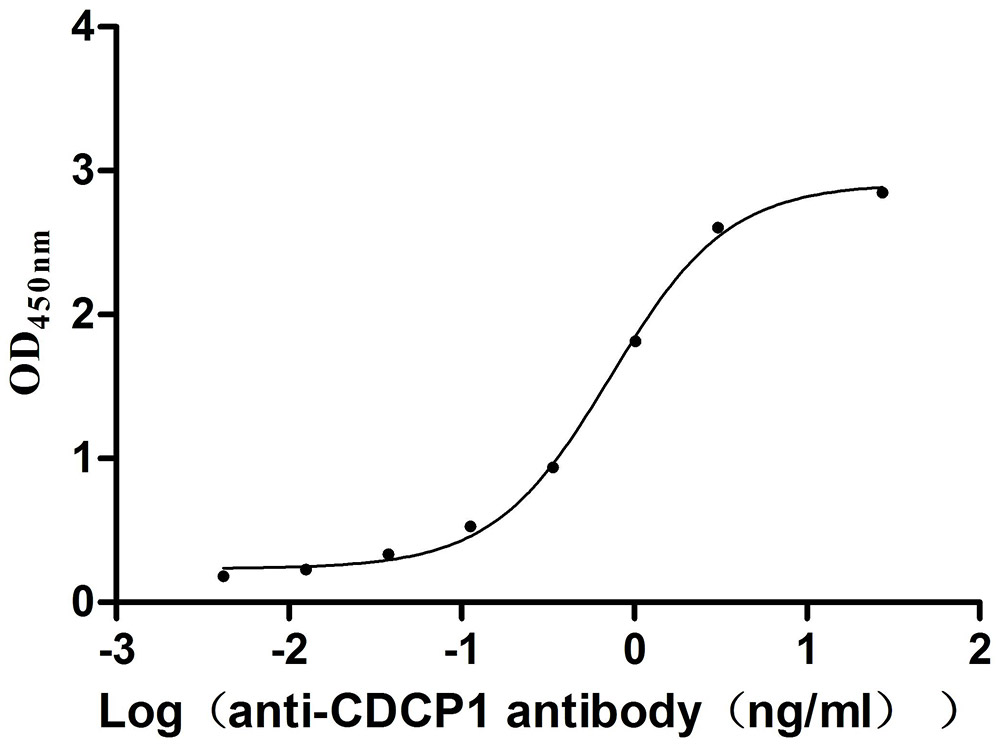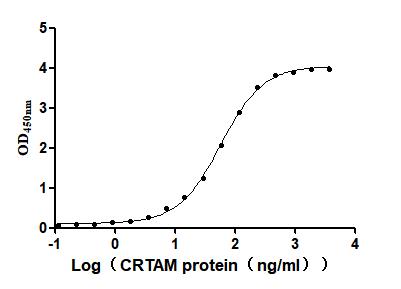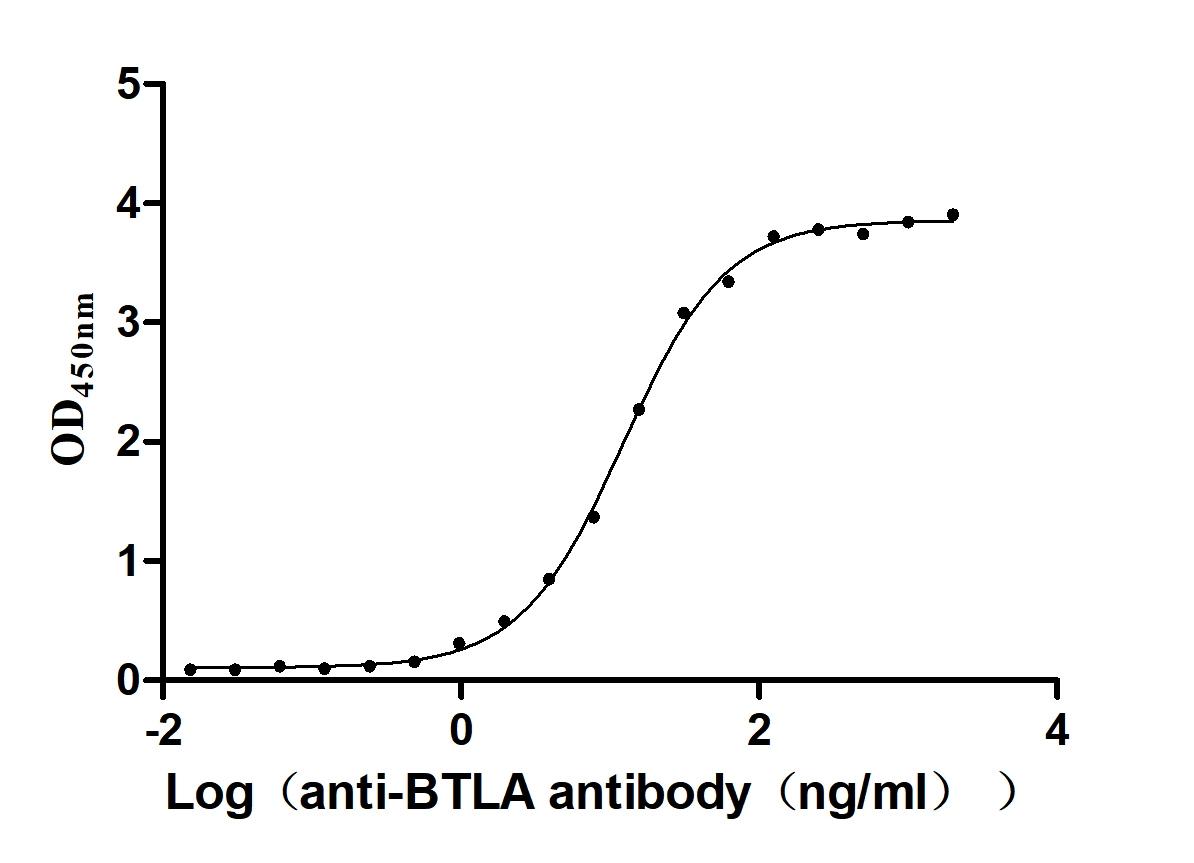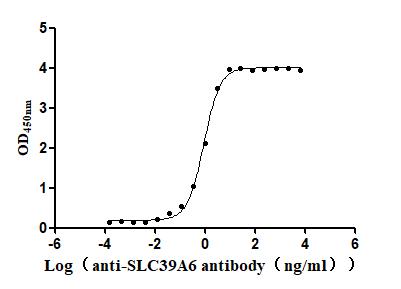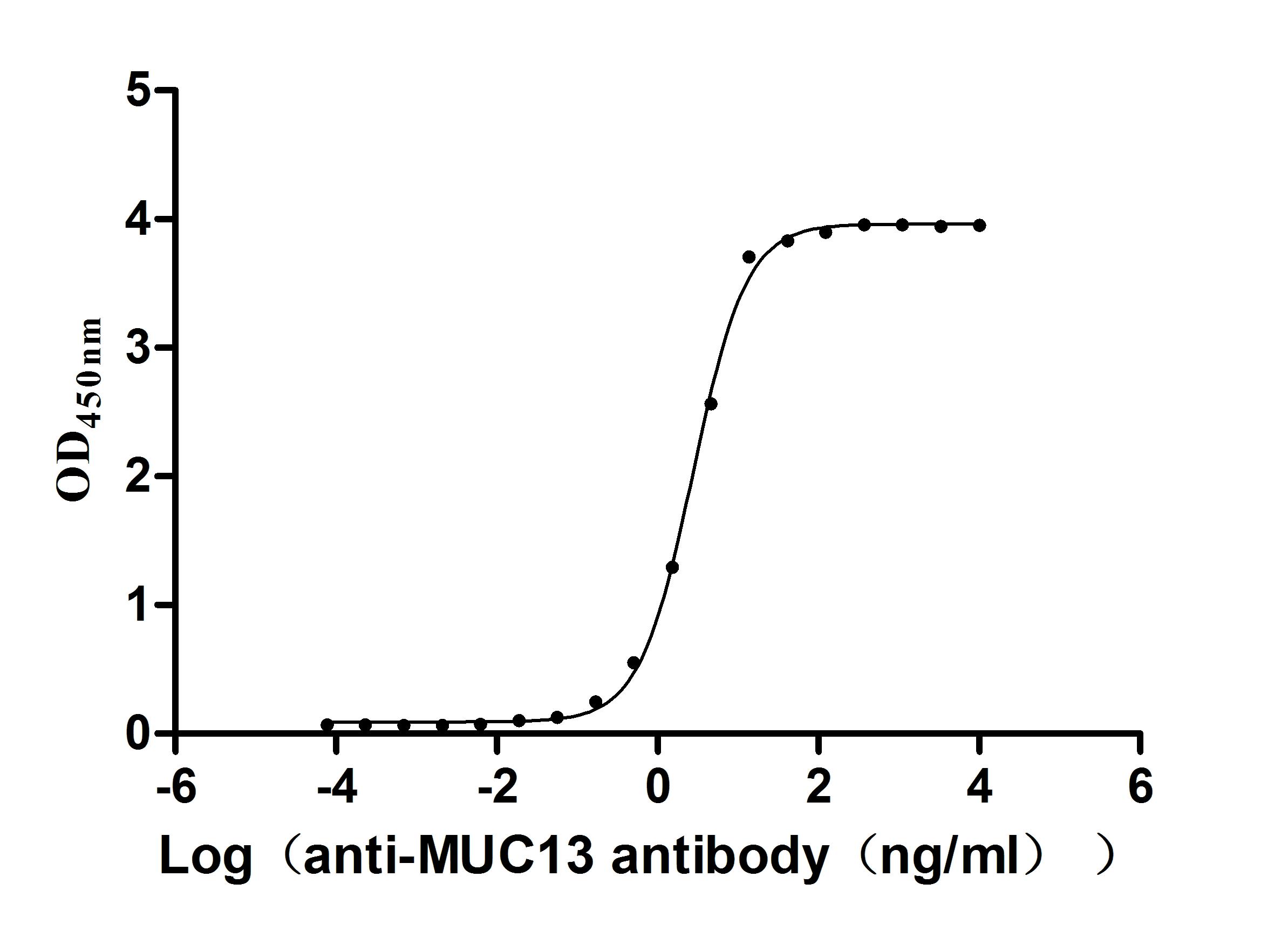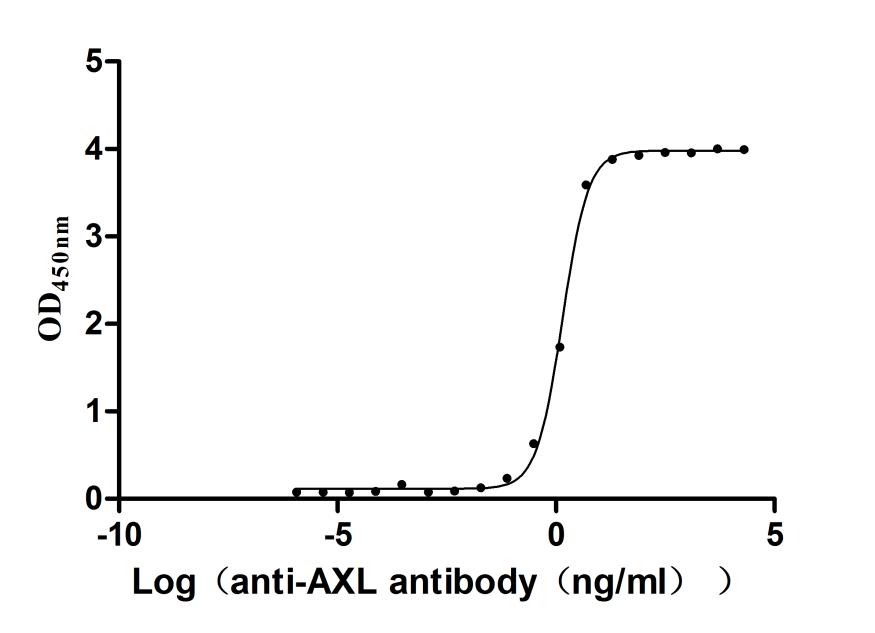Recombinant Rat Suppressor of cytokine signaling 3 (Socs3)
-
中文名称:大鼠Socs3重组蛋白
-
货号:CSB-BP022392RA
-
规格:
-
来源:Baculovirus
-
其他:
-
中文名称:大鼠Socs3重组蛋白
-
货号:CSB-EP022392RA-B
-
规格:
-
来源:E.coli
-
共轭:Avi-tag Biotinylated
E. coli biotin ligase (BirA) is highly specific in covalently attaching biotin to the 15 amino acid AviTag peptide. This recombinant protein was biotinylated in vivo by AviTag-BirA technology, which method is BriA catalyzes amide linkage between the biotin and the specific lysine of the AviTag.
-
其他:
-
中文名称:大鼠Socs3重组蛋白
-
货号:CSB-MP022392RA
-
规格:
-
来源:Mammalian cell
-
其他:
产品详情
-
纯度:Greater than 85% as determined by SDS-PAGE.
-
基因名:Name:Socs3 Synonyms:Cish3
-
Uniprot No.:
-
别名:Socs3; Cish3Suppressor of cytokine signaling 3; SOCS-3; Cytokine-inducible SH2 protein 3
-
种属:Rattus norvegicus (Rat)
-
蛋白长度:Full length protein
-
表达区域:1-225
-
氨基酸序列MVTHSKFPAA GMSRPLDTSL RLKTFSSKSE YQLVVNAVRK LQESGFYWSA VTGGEANLLL SAEPAGTFLI RDSSDQRHFF TLSVETQSGT KNLRIQCEGG SFSLQSDPRS TQPVPRFDCV LKLVHHYMPP PGAPSFSLPP TEPSFEVQEQ PPAQALPGGT PKRAYYIYSG GEKIPLVLSR PLSSNVATLQ HLCRKTVNGH LDSYEKVTQL PGPIREFLDQ YDAPL
-
蛋白标签:Tag type will be determined during the manufacturing process.
The tag type will be determined during production process. If you have specified tag type, please tell us and we will develop the specified tag preferentially. -
产品提供形式:Lyophilized powder
Note: We will preferentially ship the format that we have in stock, however, if you have any special requirement for the format, please remark your requirement when placing the order, we will prepare according to your demand. -
复溶:We recommend that this vial be briefly centrifuged prior to opening to bring the contents to the bottom. Please reconstitute protein in deionized sterile water to a concentration of 0.1-1.0 mg/mL.We recommend to add 5-50% of glycerol (final concentration) and aliquot for long-term storage at -20℃/-80℃. Our default final concentration of glycerol is 50%. Customers could use it as reference.
-
储存条件:Store at -20°C/-80°C upon receipt, aliquoting is necessary for mutiple use. Avoid repeated freeze-thaw cycles.
-
保质期:The shelf life is related to many factors, storage state, buffer ingredients, storage temperature and the stability of the protein itself.
Generally, the shelf life of liquid form is 6 months at -20°C/-80°C. The shelf life of lyophilized form is 12 months at -20°C/-80°C. -
货期:Delivery time may differ from different purchasing way or location, please kindly consult your local distributors for specific delivery time.Note: All of our proteins are default shipped with normal blue ice packs, if you request to ship with dry ice, please communicate with us in advance and extra fees will be charged.
-
注意事项:Repeated freezing and thawing is not recommended. Store working aliquots at 4°C for up to one week.
-
Datasheet :Please contact us to get it.
相关产品
靶点详情
-
功能:SOCS family proteins form part of a classical negative feedback system that regulates cytokine signal transduction. SOCS3 is involved in negative regulation of cytokines that signal through the JAK/STAT pathway. Inhibits cytokine signal transduction by binding to tyrosine kinase receptors including IL6ST/gp130, LIF, erythropoietin, insulin, IL12, GCSF and leptin receptors. Binding to JAK2 inhibits its kinase activity and regulates IL6 signaling. Suppresses fetal liver erythropoiesis. Regulates onset and maintenance of allergic responses mediated by T-helper type 2 cells. Probable substrate recognition component of a SCF-like ECS (Elongin BC-CUL2/5-SOCS-box protein) E3 ubiquitin-protein ligase complex which mediates the ubiquitination and subsequent proteasomal degradation of target proteins.
-
基因功能参考文献:
- These results suggest that SOCS3 might be a key molecular involved in the development of complicated cancer pain and that overexpression of SOCS3 might be an important strategy for treatment for mechanical allodynia associated with bone cancer. PMID: 28326931
- SOCS3 induces neurite differentiation and promotes neuronal cell survival.SOCS3-induced neurite differentiation was mediated via the PI3 kinase pathway. PMID: 27118613
- Using cultured primary neurons, JEV efficiently replicated in embryonic neurons rather than adult neurons, and the preference was accompanied by higher SOCS3 expression and protein tyrosine phosphatase activity. PMID: 28111888
- results suggest that knocking down of SOCS3 enhances dendritic regeneration and prevents demyelination after SCI PMID: 26384335
- alveolar macrophages can secrete SOCS1 and -3 in exosomes and microparticles, respectively, for uptake by alveolar epithelial cells and subsequent inhibition of STAT activation. PMID: 25847945
- SOCS-3 expression levels increased rapidly within 12 h after SAH, more slowly after 12 h, and did not reach a peak within 48 h. SOCS-3 was involved in cerebral vasospasm after subarachnoid hemorrhage via an IL-6- and IL-10-related mechanism. PMID: 24463741
- The TNF/SOCS3 pathways work through insulin receptor resistance to trigger apoptosis. PMID: 25086044
- The results of study suggest that the STAT3/SOCS3 signaling pathway plays an important role in regulating neuronal death after spinal cord injury. PMID: 24959867
- Data in vitro indicate that suppressor of cytokine signaling 3 (SOCS3) may play a negatively regulatory role in development and progression of vein graft failure. PMID: 24142708
- SOCS3 is a crucial physiological negative regulator for vein graft failure. PMID: 24685947
- SOCS3 expression accompanied the severity of inflammation and the expression of proinflammatory cytokines, as well as the activation status of STAT3 and p38 MAPK PMID: 24078776
- SOCS3-induced pro-inflammatory effects were due, at least in part, to its role in controlling activation and nuclear accumulation of nuclear factor-kappaB and activity of phosphatidylinositol 3-kinase. PMID: 24088176
- Prolactin stimulates normal liver growth, promotes survival, and regulates liver regeneration by mechanisms that may include hepatic downregulation of IL-6 and upregulation of SOCS-3, increased hepatocyte proliferation, and angiogenesis. PMID: 23948778
- IL-1b alone did not significantly increase SOCS-3 levels but when coincubated with insulin, prevented the downregulation of SOCS-3 expression. XOMA 052 neutralized the antagonistic effect of IL-1b on insulin-induced downregulation of SOCS-3. PMID: 23401297
- The expressions of C/EBPalpha and PPARgamma were significantly reduced after gene silencing of SOCS-1 or SOCS-3 in adipocytes. PMID: 23222907
- Vagal afferent neurons of diet-induced obese rats become leptin resistant; LPS and SOCS-3 may play a role in the development of leptin resistance. PMID: 21521717
- Data suggest that down-regulation of SOCS-1 and SOCS-3 ameliorates the capacity of glucose transport and provides a potential gene therapy approach to managing metabolic syndrome. PMID: 21364493
- With respect to neurite outgrowth SOCS3 alone is (as expected) strongly inhibitory, but it can also enhance the growth-promoting activity of mitogen-activated protein kinase 8 interacting protein 1 (JIP1). PMID: 20816823
- Chronic central leptin infusion increases the association of insulin receptor with SOCS3. PMID: 21255014
- Our data demonstrate the negative impact of enhanced SOCS3 expression on the regenerative potential of mature central nervous system neurons. PMID: 21145973
- postnatal overnutrition induced higher SOCS3 expression in adult animals,indicating central leptin resistance in adulthood. PMID: 20303731
- SOCS-3 knockdown may have increased the leptin-mediated in situ fatty acid oxidation in the DIO adipocytes, and therefore, SOCS-3 might be an excellent target for therapeutic intervention for obesity. PMID: 19862646
- AngII response in spontaneouly hypertensive rats associated with increased hypothalamic JAK-2/SOCS-3 expression may suggest that abnormal regulation of the central angiotensin pathways may contribute to dysfunction of water-electrolyte homeostasis. PMID: 20848345
- role of SOCS3 expressed in the mediobasal hypothalamus (MBH) in development of diet-induced obesity; data suggest knockdown of Socs3 mRNA limited to the MBH increases Npy mRNA levels, which decreases locomotor activity and alters feeding patterns PMID: 20819948
- SOCS3 of retina may play an important role in mitigating pathogenic effects of proinflammatory cytokines during different stages of experimental autoimmune uveoretinitis. PMID: 19176113
- High leptin concentration could induce the expressions of SOCS-3 mRNA and protein in mature adipocytes. PMID: 19408656
- SOCS3 knock-down does not influence the growth and adipogenic differentiation feature of adipose-derived stromal cells. PMID: 19693688
- Noradrenaline acting at central beta-adrenoceptors induces Socs3 expression in rat brain. PMID: 20193756
- increased expression in diabetes PMID: 20185635
- Results suggest that SOCS-3 may be a mediator of hypothalamic leptin resistance in aged rats, and that increased SOCS-3 expression may be due to age-related hyperleptinemia. PMID: 12163036
- Antisense knockdown of ischemia-induced SOCS-3 protein expression exacerbated transient MCAO-induced infarct volume, assigning a neuroprotective role to SOCS-3 PMID: 12437578
- induced by Ang II in rat heart and neonatal rat ventricular myocytes and participates in the modulation of the signal generated by this hormone PMID: 12960061
- SOCS-3 exhibits a rapid, robust, and transient induction in hippocampus after seizure, first in glia, followed by a robust induction in pyramidal and granule neurons, peaking at approximately 24 hr. PMID: 14614901
- SOCS-3 participates, as a late event, in the negative cross-talk between angiotensin II and insulin, producing an inhibitory effect on insulin-induced glucose transporter-4 translocation. PMID: 15514089
- Cross-talk between the SOCS/interferon and the IL-1beta pathways of signalling in pancreatic beta cells. PMID: 15578154
- Socs3 overexpression leads to neuroblastoma cell death and, on the other hand, leads to primary cell differentiation, indicating the involvement of SOCS-3 in neuronal cell survival and differentiation. PMID: 15998644
- Promoter deletion analysis revealed that the STAT response element (SRE) in the SOCS3 promoter is necessary for the promoter activity. PMID: 16300827
- involvement of SOCS3 in a direct gene regulatory pathway downstream of leptin-activated JAK-STAT signaling in pancreatic beta-cells PMID: 16306356
- These data suggest that training-induced elevations in SOCS-3 expression in skeletal muscle may contribute to the exercise-induced increase in IL-6 expression. PMID: 16484300
- Leptin induced SOCS-3 expression and its association with the insulin receptor in rat skeletal muscle cells but functional significance of this increase was not apparent upon measuring glucose uptake. PMID: 17223256
- SOCS-3 might have a defensive role in H. pylori-infected gastric mucosal cells PMID: 17405912
- increased glomerular IL-4 in nephrotoxic nephritis inhibits infiltrating macrophages from expressing SOCS3 and was associated with attenuated glomerular injury PMID: 18424750
- These results demonstrate SOCS-3 induction occurs in reactive astrocytes of the post-ischemic hippocampus, suggesting that SOCS-3 is involved in regulating the astroglial reaction to an ischemic insult. PMID: 18586073
- The up-regulation of SOCS1 and SOCS3 gene expression may be one of the possible mechanisms responsible for endotoxin tolerance. PMID: 19080716
- The objective of this study was to investigate the effect of SOCS-3 on TNFalpha-induced signalling in beta cells. PMID: 19643162
显示更多
收起更多
-
数据库链接:
KEGG: rno:89829
STRING: 10116.ENSRNOP00000003940
UniGene: Rn.127801
Most popular with customers
-
Recombinant Human papillomavirus type 16 Protein E7 (E7) (Active)
Express system: E.coli
Species: Human papillomavirus type 16
-
Recombinant Human Melanoma-associated antigen 4 (MAGEA4) (Active)
Express system: Mammalian cell
Species: Homo sapiens (Human)
-
Recombinant Mouse CUB domain-containing protein 1 (Cdcp1), partial (Active)
Express system: Mammalian cell
Species: Mus musculus (Mouse)
-
Recombinant Mouse Cytotoxic and regulatory T-cell molecule (Crtam), partial (Active)
Express system: Mammalian cell
Species: Mus musculus (Mouse)
-
Recombinant Human B- and T-lymphocyte attenuator(BTLA), partial (Active)
Express system: Mammalian cell
Species: Homo sapiens (Human)
-
Recombinant Macaca fascicularis Zinc transporter ZIP6 isoform X1(SLC39A6),partial (Active)
Express system: Baculovirus
Species: Macaca fascicularis (Crab-eating macaque) (Cynomolgus monkey)
-
Recombinant Human Mucin-13(MUC13),partial (Active)
Express system: yeast
Species: Homo sapiens (Human)
-
Recombinant Human Tyrosine-protein kinase receptor UFO(AXL),partial (Active)
Express system: Mammalian cell
Species: Homo sapiens (Human)


